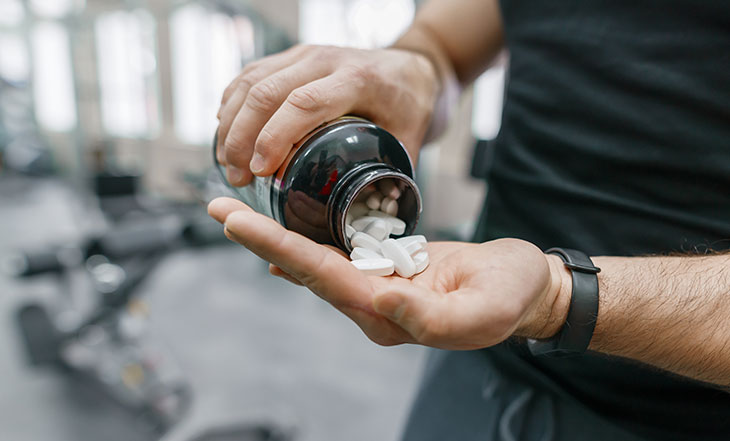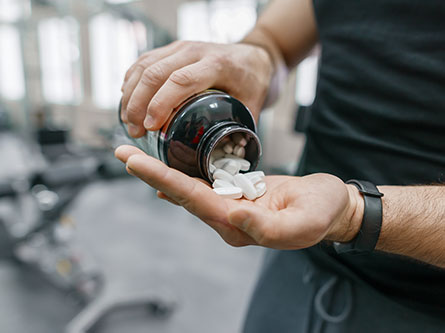
Athletes have an ever-expanding variety of pills, powders, drinks, and other tools to choose from that promise to make them faster, stronger and bigger.
Sales figures indicate that many athletes and fitness gurus have bought into that promise. But it's largely an empty one. Performance supplements should not be a substitute for healthy nutrition and drinking water.
Research on exercise supplements
There's no scientific evidence to support products that claim they'll increase muscle size, strength, energy or athletic performance. But many athletes look for any way to gain an edge on their competition or quickly reach their personal goals.
People are often swayed by clever marketing techniques, videos on social media, or professional athletes who endorse nutritional supplements. Often, "experts" who aren't qualified or don't have a background in nutrition make inaccurate claims about these products.
Because there is no standard for many of these supplements, it can be common to find several different chemical formulas, depending on the company. Each one claims it contains the same vital compound.
Learn more about dietary supplements for exercises and athletic performance
Safety information on protein supplements
Supplements for amino acids, the building blocks for protein, are promoted as helping build muscle. However, the average American diet already has two-to-three times more protein than is needed.
Read: When it comes to protein, how much is too much?
It's also important to note that high levels of specific amino acids can potentially produce a toxic effect. It can place an extra burden on your kidneys and contribute to kidney failure in the long-term.
Unnecessarily adding individual vitamins and minerals into your diet can also create imbalances within your body. This can lead to major changes or long-term health effects. Unnecessary supplements can be potentially toxic and may reduce your body's ability to absorb other nutrients.
One example comes from a 2022 report released by the U.S. Food and Drug Administration (FDA). The report included information that some bodybuilding products posed serious health risks.
The FDA found that some products that claimed to help build muscle mass and strength illegally contained steroids or steroid-like substances that can cause series liver injury. Many of these bodybuilding products were labeled as "dietary supplements" in stores and online. This all came to light after the FDA received hundreds of reports of adverse reactions to some supplements.
In cases like this, it can be hard for the FDA to regulate and find the sellers, especially if the products are sold only online. Retailers and websites will often change their name or relabel their products to evade authorities and scam customers, according to the FDA.
Sports drink intake should be rare
Sports drinks are popular, but they should be used properly.
The purpose of these beverages is to provide fluid, carbohydrates (carbs) and electrolytes during long endurance events. These are times where energy stores are low, and water and electrolytes are lost in sweat. In these cases, sports drinks can support athletic performance and help with recovery.
Sports drinks should not be the main source of fluid in your diet. They add extra calories, which can hinder weight goals. They also have added sodium, which may be unnecessary and can contribute to high blood pressure.
If you exercise for less than an hour in a mild environment, water is the only thing you should need. It's enough to refuel your body during exercise.
Learn why it's important for you to drink water and stay hydrated
A well-balanced diet and plenty of water is enough
As long as athletes eat a well-balanced diet and drink plenty of water, that should be all that they need. A lot of people use products that are not scientifically sound. Some of them aren't even regulated by the FDA. And to top it off, supplements can quickly gobble up your money.
Athletes who need more carbs than the normal person are those who participate in long events, such as triathlons or marathons. But even those athletes simply need more food and liquid in their diets in the form of carbs and electrolytes to replace losses.
If you're interested in using any supplement, talk to your health care provider. You should also consider buying from companies that receive third-party testing. Checking for an NSF certification ensures the product is made with good manufacturing practices.
Learn more about the sports nutrition program at UC Davis Health
Get more out of your training with UC Davis Health’s sports performance program




